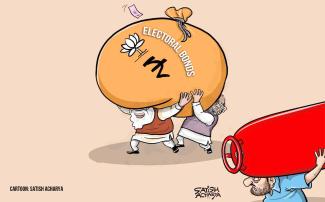A five-member constitution bench of the Supreme Court has finally struck down the Modi Government's Electoral Bond scheme as being unconstitutional. The scheme has indeed been one of the most brazen scams in recent years and it is great to see the Supreme Court finally taking the call and pronouncing a verdict that will go down as a heartening vindication of the rights of the people in a democracy, especially in the unequal battle against corporate power in today's India. While striking down the scheme the Supreme Court has also asked SBI to furnish all details about bonds encashed so far including the identity of donors and recipients to the ECI by 6 March so the latter can make this information public by 13 March.
Everything about the Electoral Bonds has been a brazen mockery of the constitution and democracy. It was passed fraudulently in parliament by presenting the scheme as a part of the 2017 Money Bill so it could escape scrutiny in the Rajya Sabha where the BJP did not have a majority. Even in the Supreme Court, the government invoked the doctrine of judicial restraint as is applicable to economic policy matters where the court usually does not interfere. Far from lessening the use of cash or black money in elections, the scheme has only exponentially increased the influence of money power in elections. And by granting anonymity to unlimited corporate funding the scheme thoroughly undermined the electorate's right to information and the consequent ability to make informed political choices.
The introduction of the Electoral Bond scheme had necessitated major amendments to a whole set of legislations including the Companies Act, 2013, Income Tax Act, 1961 and the Representation of the People Act, 1951. Earlier, companies in existence for at least three years could contribute no more than 7.5% of the average profit earned in the past three years as political contribution and the details had to be shared with shareholders of the concerned company. Political parties were also required by law to furnish details about every donation above Rs. 20,000. The Electoral Bond scheme removed all these restrictions by paving the way for unlimited contribution by any company, including Indian subsidiaries of foreign companies, and exempting political parties from sharing details about contributions received by way of electoral bonds except mentioning the consolidated total amount.
On February 5, the Modi Government told the Lok Sabha that Electoral Bonds worth Rs 16,518 crore had been issued in 30 tranches since the launch of the scheme. Pending the submission of latest annual returns by political parties, the last figures available are till FY 2022-23, and according to these figures, the BJP had received Rs 6,555.12 crore out of a total of Rs 12,979 crore, almost six times the amount received by the Congress (Rs 1123.29 crore). The difference is bound to be even bigger once the latest figures are included. Next to the BJP and the Congress, parties ruling in various states like the TMC in West Bengal, BRS in Telangana, BJD in Odisha, DMK in Tamil Nadu and YSRCP in Andhra Pradesh have received amounts in excess of Rs 350 crore.
Electoral Bonds are thus anonymous instruments of corporate funding for parties in power and the BJP running double engine governments in most states is by far the biggest beneficiary of this scheme. The bonds are issued in five different denominations ranging from 1,000 to 10 million. But according to the figure of bonds sold till July 2023, more than 94% of the total value of bonds sold was through the 10 million denomination and more than 5 percent through bonds of one million denomination. Clearly, those donating funds through electoral bonds are large corporate donors and not ordinary individuals. We should also understand that electoral bonds have not replaced other channels of corporate funding or black money transactions. Indeed, the use of cash in elections and black money in post-poll horse-trading to topple governments and cobble together majorities has only increased enormously in recent years.
The huge corporate contributions channelised through electoral bonds are clearly not acts of philanthropy or 'corporate social responsibility'. Once the detailed figures are published and identities of donors and recipients are revealed, we will be able to see a clear quid pro quo between these corporate contributions and reciprocal benefits extended to the corporates by the beneficiary parties when in government, the Modi government and BJP-led state governments in particular. The cover of anonymity guarding the scheme is precisely meant to keep this quid pro quo, the growing bonhomie between corporate cronies and their political partners, shrouded in secrecy. The electoral bond scheme is essentially a euphemism for unregulated and unlimited corporate bribery which has already hugely distorted India's electoral process. It is the bridge between massive concentration of wealth in a few hands and increasing tilting of the electoral balance in favour of the most favoured party of India's big corporates.
It remains to be seen whether the SBI, the EC and the Modi government which today controls every institution of constitutional governance actually complies with the Supreme Court order. Regardless of the government's response, we the people of India must however draw strength from this belated judicial fillip to India's beleaguered democracy and intensify the battle to reclaim the republic. Using the electoral bond disclosures to expose the bond between corporate power and state power that underpins every brand of fascism is an important immediate task. Equally important is to fulfill the challenge of voting out the government which inflicted this unconstitutional scheme on the people and which has used these ill-gotten gains to win power and tighten its political stranglehold.











